#a haiku specifically
Explore tagged Tumblr posts
Text
i need to read every poetry anthology ever
#like the collections that are selected poems by heart or like 100 love poems or like a specific historical period#or like the books of cat poems or the poems on the underground#all the penguin collections like haiku or different languages in translation#AAAAA#diary#tiyas thoughts
81 notes
·
View notes
Note
the term is not kigu it's kigo (季語)
Yeah I will fully admit when I woke up this morning to see seanan mcguire had reblogged it my immediate thought was "no it has such an embarrassing misspeaking on my partttt". I think I remember when writing the post originally thinking it was kigu, and then correcting myself with "No, that's the pajamas, it's kigo", and then double-psyching myself out by going "Wait, no, it's kigu and you're overthinking things" and going with that.
#also the bit where i accidentally imply all English poetry is inherently shallow comparatively. like nooooo i was in such a rush to type#that i forgot to clarify that this is specifically within the context of haiku as intended i am not just disparaging all English canon...#beats the me of a year ago up for making extremely dumb mistakes online#if anyone tried to like. google kigo and couldnt find out more bc they googled kigu instead im sorry T_T
46 notes
·
View notes
Text
november
fading colors show the skeletons of nature as strong vivid lines
#fictionadventurer poetry#poetry#and....goal met!#thirty poems for the month!#pretty darn good given that i started on the twentieth#and only wrote five last week#after a month focusing on the snow and winter side of things#had to finish off with something about november specifically#and a haiku because when i've done this many poems in a day i don't have time for anything more strenuous
10 notes
·
View notes
Text
Going through my life
Just taking care of business
Then BOOM! Memories.
#this is about me remembering something specific my ex did years ago#out of the blue#like come on man this is just annoying#she doesnt even go here#haiku#poem#poetry#original haiku#original poem#original poetry#haiku poetry#haiku poem#poets of tumblr
6 notes
·
View notes
Text
No one should be following this blog. I have pathological Committed to the Bit disease and I'm gonna make all your dashboards hell
#my followers count right now is over zero and that seems morally wrong#but i support free choice have fun#im trying to only spam haiku-bot and op who specifically asked for this
3 notes
·
View notes
Text
this isn't goodbye - localcryptidlivinlife - The Trials of Apollo - Rick Riordan [Archive of Our Own]
you guys get an acrostic for today!
Also! bonus haiku since I was in a poetic mood today.
I love my kids so much Who shine bright like the sun They are so awesome
#toapril#toapril 2024#toapril2024#apollo#he loves his kids guys. he loves them so much#it's actually insane the love he has for his kids#poetry. acrostics and haiku to be specific
5 notes
·
View notes
Text
Ok I just need to check something: la da dee diddum lada da dum doo diddle dum doo la dee do
There, that's sufficient
#tally hall#is maybe haiku idk the lyrics sound like one but that may be to pronunciation and timing rather than the actual lyrics so idk I'm gonna see#If the haiku bot actually does it's little funky thing#Then again it would be in character for tally hall to make lyrics that correspond so much with the song#But that's a poor point to make with these lyrics specifically#but I can't do many other verses because I feel like if I say haiku the haiku bot won't work#But saying haiku in the tags is probably fine#Especially because I didn't format it like a haiku
3 notes
·
View notes
Text
Sometimes I really want to write down my posts like a haiku just for funsies
0 notes
Text
What do you call these babies?!?! They are DELIGHTFUL and I want them so bad right now. Savory stuffed taro root that is then deep fried. I had them once at a dim sum place but didnt order them myself. I've seen them referred to as wu gok on a cursory internet search. much appreciated if anyone would input their knowledge on this wonderful food
I always want them- incredible, delicious, and wonderful treats

[image of a deep fried dim sum dish on a doily, the exterior of the food is golden brown and delicately crispy, while the interior is a purple-ish gray color with a starchy texture]
#dim sum#i know somebody out there is an amateur expert specifically on these things and has been waiting to share their knowledge#cause thats how tumblr works#wu gok?#taro#delicious food#help#savory#sweet#delectable#cooking#recipes#deep fried#how is it so good#where is this from#food history#haiku
1 note
·
View note
Text
*not the haiku bot and not a traditional haiku but-
Feeling ver-
Y unethical today
Might spread hate
Feeling very unethical today, might spread hate
#this is dumb#why am i here#also#haiku#becuase with the specific definition of haiku#there is no rule that states it must be a 5-7-5 syllable pattern#it can be 3-5-3#it can be- other ones#idk ive only ever seen the 3 5 3 variation#i just think its cool#and i like pukicho#and i need attention 🥲
24K notes
·
View notes
Text
"Can I kiss you?"
"I don't know, can you?"
The second the words are out of his mouth Will prays for death.
Oh my gods.
"Purge it," he orders, words muffled by his own hands. He glares when Nico laughs. "I'm not joking, purge that from your memory or I'll do it for you --"
"Solace," says Nico, and there are crinkles in the corners of his eyes, and his smile is just slightly crooked, and his hands are cool like cobblestones in the early mornings on the rings of his wrists. He tightens when Will continues to try to wrench away. Or hit him. Or both.
So fucking humiliating.
"Solace, hold still."
Ever since ten year old yapatron dork Nico di Angelo stepped foot in this godforsaken child soldier hellscape however many years ago, Will refuses to count for his own mental health, he has not known peace. Since the very first day the bright-eyed smirking punk pulled up with a pack of cards and a literal bag to collect the change he swindled out of the Entire Apollo cabin, Will has been karate-chopped in the face with the very specific strain of the Ella Enchanted curse wherein his stupid mindless drone of a brain stops every available function and immediately pivots to do whatever Emo Boy commands. It's an issue. It's a problem. It's a curse, and no one takes him seriously.
"Bars," Nico says solemnly.
Will snaps his teeth at him.
"You know, you get kind of bitey and hot when you're embarrassed."
"Shut the fuck up."
"I'm just saying," Nico grins. "It happens when you're angry, too. You get this -- dimple, here, when you scowl."
He reaches out without permission and presses his thumb into the divot of Will's cheek, ridges of his fingerprint sliding along the valleys of his spattered scars. Like the jagged edges of torn paper.
There's a haiku in there, says the Apollo that lives forever in Will's brain.
I'll kill myself for real, seethes Will back at it.
He notices Nico's widening smile when his delicate hands reach behind the curve of his ear, sliding through strands of his hair. His palm burns icily along the length of his jaw.
Coincidentally, his heartrate jumps three ECG strips.
"So?"
"So what."
His voice cracks so horribly the clouds wince in sympathy. Were his face capable of getting any redder, it would, but at this point in time it was already riding the line between roan and pumice.
"So." Nico ducks his head, meeting Will's eyes. "Can I kiss you." He snorts. "Or, rather: may I kiss you."
Will thinks of saying no, just to be difficult. But then the ten-year-old Will that lives in his mind throws himself to his knees, weeping in agony, and he relents.
"Fine," he says quickly. "But only a little one and it can't be very good!"
Nico raises an amused eyebrow.
"It can't?"
"No! I'm in -- scrubs!"
"As opposed to your ratty camp shirt," Nico surmises. "Ah, yes." He waits a little. He smirks. Will clocks the fuckin' Look in his eye one half millisecond too late, because God hates him. Yeah. That one. "Or, you know. The scrubs don't have to stay on."
"Bye."
Will turns around to leave, or tries to, but the sheer amount of blood in his head and face region leaves him more than a little lightheated, so he goes ahead and just sways right into Nico's waiting arms. Why not? His dignity is dead and buried. Might as well put some flowers on the grave.
Or something.
Look. You try digging up metaphors when none and all of your synapses are firing at once, somehow.
"You're so dramatic," Nico murmurs, voice liquid with fondness. The curve of his smile melts into something sweet and he adjusts his arms around Will's waist, dipping him backwards. "I am going to kiss you, now. Stop me."
"'Kay," Will squeaks, and grips onto strong, wiry shoulders as hard as he can. His toes curl.
He's laughing, when he presses their lips together.
It tastes like sweet bubblegum and ancient TV static.
#i never know how to write the kiss#and the kiss is always a letdown anyway#nothing tastes as good as the anticipation of it#anyways. 49 more prompts to go!#pjo#percy jackson and then olympians#hoo#heroes of olympus#pjo hoo toa#nico di angelo#will solace#nico di angelo/will solace#nico/will#will/nico#smooth nico di angelo#now is he that smooth or is will just that disastrous#ill let u decice#porque no los dos etc etc#disaster will solace#pining nico di angelo#whipped nico di angelo#my writing#fic#longpost#100 ways#100 ways to say i love you
471 notes
·
View notes
Text
John Lennon and Yoko Ono: his affairs, binges and diet pills
For years the radio host Elliot Mintz was the only person the former Beatle and his wife trusted. Now, he has written a book about his intense relationship with the couple — including what really happened during Lennon’s infamous ‘Lost Weekend’
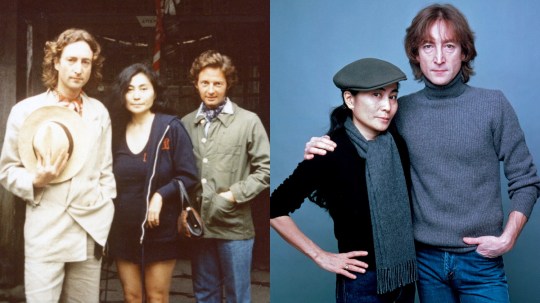
John Lennon, Yoko Ono and Elliot Mintz outside the Mampei Hotel in Karuizawa, Japan, 1977. Right: Lennon and Ono in 1980
I am holding a pair of glasses. They are antique, made of steel wire and perfectly round. The trademarked name is the Panto 45. This is the 26th pair of John’s glasses I’ve examined on this snowy night in February 1981. It’s been about two months since he was gunned down in New York outside the Dakota, the gothic edifice where he and Yoko Ono had been living since 1973.
I’ve been tasked with the responsibility of inventorying his personal effects so that Yoko, and posterity, would know precisely what he had left behind. I did not want this task. For one thing, I live 2,500 miles from the Dakota, in Los Angeles, where I host a late-night radio interview show. But Yoko asked me to do it, and I have rarely been able to say no to Yoko, let alone John.
I found their idealism infectious and inspiring. Still, as I got to know John and Yoko as flesh-and-blood friends, I began to see their flawed human sides as well.
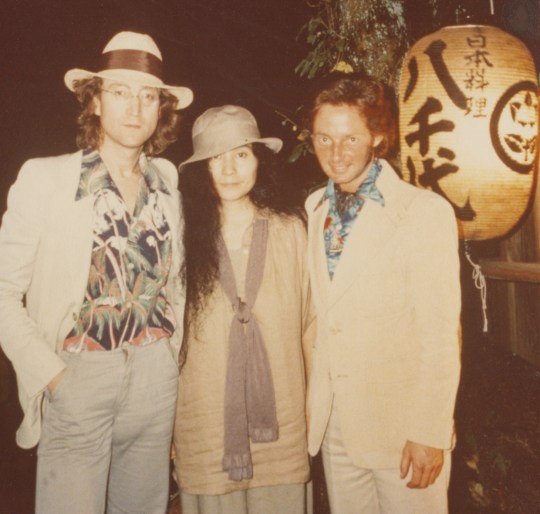
The trio at a restaurant in Kyoto, 1977
Yoko, for one, was even more airy and ethereal in private than she was in the media. She could be a fountain of aphorisms, dispensing endless nuggets of Zen-like philosophy. Her haiku-esque homilies on manifesting one’s desires or the wisdom of the nonrational mind could be a bit much for some people.
There were moments when even I was a bit baffled by it all. Except then she would say or do something that would absolutely convince me that she was connected to some higher plane.
John, meanwhile, was every bit as charming, funny and intelligent as he came across in public. But I gradually discovered he was far from perfect. For starters, for a guy who aspired to be a world-shaking peacemaker — a thought leader on a par with Mahatma Gandhi, Martin Luther King Jr and Nelson Mandela — he was surprisingly uninformed about historic figures like, well, Gandhi, King and Mandela.
He also had some Luddite-like notions about science, particularly medicine, extending well beyond his annoyance at “daddy doctors” for not letting him perform his own weight-loss injections. Even though John had smoked, ingested or snorted just about every illegal recreational drug he could get his hands on, he was weirdly suspicious of the ones that were properly prescribed and proven efficacious.
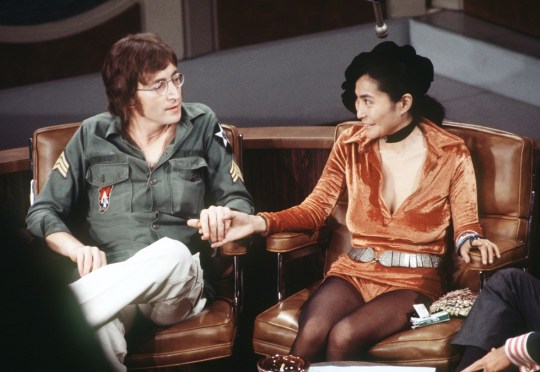
Lennon and Ono on The Dick Cavett Show, 1971
John and Yoko could be incredibly sensitive, honest, provocative, caring, creative, generous and wise. They could also be self-centred, desperate, vain, petty and annoying. In John’s case, also shockingly cruel — even to Yoko.
An example…
Early one morning in November 1972, the red ceiling light that would flash whenever my hotline to John and Yoko rang started blinking. I picked up.
“Ellie, I f***ed up,” were the first words out of John’s mouth.
“Why?” I groggily asked. “What did you do?”
“We were at this party last night,” he said, “and I got loaded. And there was a girl…”
I sat up in bed.
The party was at Jerry Rubin’s Greenwich Village apartment. A small crowd of well-connected peaceniks had gathered to watch the presidential election returns on television. As it became clear that Richard Nixon would win re-election by a landslide, the mood grew bleaker and the crowd began drinking more heavily.
Alcohol was not John’s friend and on this occasion, John’s evil inner gremlins truly outdid themselves.
I got some of the specifics from a hungover John during his morning-after call. The upshot was that John had indeed hit it off with some girl at the party and had slipped into a bedroom with her, where they proceeded to have such loud, raucous sex that everyone sitting around the TV in Rubin’s living room — including Yoko — could clearly hear them going at it.
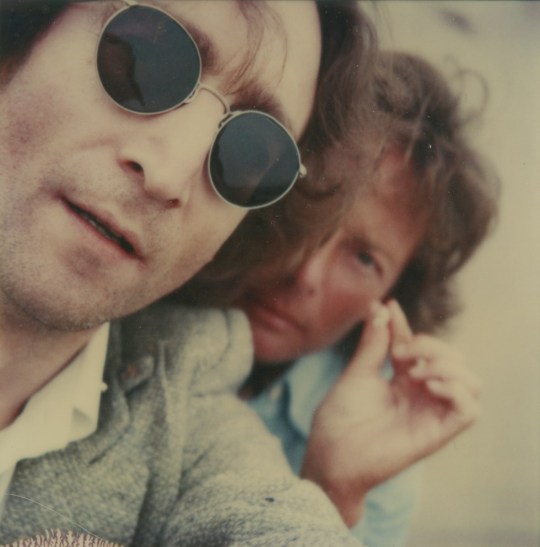
Lennon and Mintz in 1972
At one point, a well-meaning guest put a record on the turntable — Bob Dylan’s 11-minute ballad Sad Eyed Lady of the Lowlands — at high volume. Yoko sat on the sofa in stunned, mortified silence.
Whatever they said to each other later, I suspect the conversation was not a pleasant one.
“I slept on the sofa,” John told me, sounding defeated and embarrassed — although, frankly, not quite as contrite as I thought his situation warranted. “Things like that happen,” he said, way too matter-of-factly for my taste. “A bloke cheats on his wife… If I weren’t famous, nobody would care.”
Yoko, unsurprisingly, felt differently.
“Are you OK?” I gently asked her when I phoned to check in on her a few hours later.
“There is no answer to that question,” she said shakily.
“Do you think you’ll ever be able to forgive him?”
“I can forgive him,” she said. “But I don’t know if I can ever forget what happened. I don’t know if it will ever be the same.”
After a few weeks of cooling down, though — during which Yoko wrote and recorded Death of Samantha, her bluesy ode to burying one’s pain for the sake of outward appearances — the crisis seemed to abate. John and Yoko chose to roll the cosmic dice with a spectacular gesture of faith and hope in the staying power of their love. They bought an apartment in the Dakota.
“It’s apartment No 72,” Yoko announced when she called to tell me about the purchase. “Do you see the significance?”
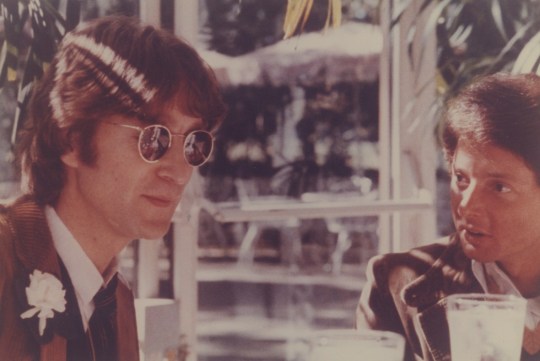
Lennon’s 38th birthday party, 1978
When you add seven and two, you get nine, Yoko explained, which was a hugely significant numeral to the Lennons, a magic integer that seemed to mysteriously recur throughout John’s life. Yoko would rattle off the number’s many repeated appearances: John was born on October 9. She was born on February 18 (1 plus 8). Paul McCartney’s last name has nine letters…
I was somewhat mystified as to why they chose this particular neighbourhood. “Aren’t you worried it’ll be too stuffy for you?” I asked John. “Will the people who live there even know who you are?”
“I don’t want them to know who we are,” he said with a laugh. “I don’t want to know who they are. We just want to be left alone.”
The Dakota struck me as one of the most eerily beautiful — and oddly daunting — structures in all of New York. John and Yoko greeted me in the vaulted vestibule, eager to begin our tour, which started on the ground floor with the new headquarters for Studio One, the business entity behind John and Yoko’s creative enterprises. Tellingly, John did not have an office in Studio One; Yoko did.
The main attraction was on the seventh floor. It was nearly 5,000sq ft, with massive windows offering eye-popping views of Central Park. Virtually everything in its expansive living room, from the plush carpeting to the grand Steinway piano, was as white as Japanese snowbells.
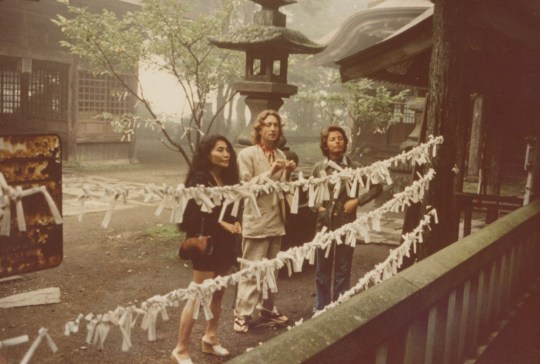
Lennon, Ono and Mintz at a Shinto temple in Kyoto. The custom was to hang your horoscope on a line
There was only one highly conspicuous work of art in the White Room: a Plexiglass case on a white pedestal, in which was a 3,000-year-old sarcophagus. John and Yoko had scored the very last mummy allowed out of Egypt before the Egyptian government put a ban on exporting their national antiquities.
“You should x-ray it and see what’s inside,” I suggested. “There might be something of great value, like precious jewels.”
“I don’t care what’s inside,” Yoko responded. “The great value is the magic of the mummy itself.”
Another thing I clearly remember about that long afternoon at the Dakota was how enthusiastic both John and Yoko seemed about the life they were building together in this new nest. John giddily described the “entertainment centre” he wanted to construct in a nook off the kitchen. Yoko, ever the artist, chattered about the endless design ideas she had. It was all too easy to forget about the pain and stress they’d been dealing with. I managed to convince myself that the worst was over for John and Yoko. I was wrong.
There are those who believe Yoko not only approved of the affair but arranged it. That she planted May Pang in the seat next to John on that American Airlines flight from New York to Los Angeles knowing full well what was likely to happen. That their comely 23-year-old assistant would sooner or later end up sleeping with her husband.
It’s possible, I suppose. It could be she saw some strategic long-term advantage in setting up the affair; by handpicking John’s mistress, she might have felt she could exert some dominion over his extramarital wanderings. Perhaps, thanks to her mystical advisers, she really did see that John was heading for a free fall and was endeavouring to soften his inevitable crash.
If any of that is true, though, Yoko never breathed a word of it to me. All she said in October 1973 was that she was sending John and an assistant to LA. Could I please meet them at the airport?
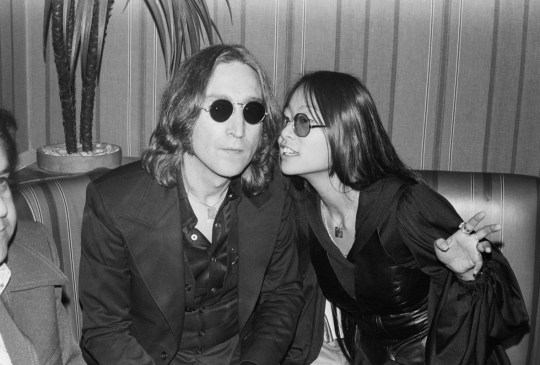
With his assistant and lover, May Pang, 1974
I was by then aware that their marriage was in deep trouble. Despite their best efforts to mend the relationship, the red light on my bedroom ceiling had been blinking even more feverishly than usual leading up to what would later be known as John’s “Lost Weekend”, the 18 months he spent in exile from his wife in New York.
Yoko’s demeanour back then, as always, was not demonstrably emotional but it was clear from our phone conversations that she was in pain. John’s calls were every bit as depressing.
“Has Mother been talking to you about us?” he asked during one early morning chat.
“Yoko talks to me about everything,” I answered vaguely.
“The other day I shaved and got dressed up and told her I wanted to take her to her favourite restaurant and she turned me down,” he lamented. “She said she didn’t have time. Me own f***ing wife said that to me!”
Yoko has always been a methodical person, and my guess is that she precisely and carefully orchestrated John’s eviction from the Dakota. John might not have even realised what was happening to him. He certainly didn’t seem like a man who’d been kicked out of his home when I met him and May Pang at LA airport.
“You look trim, Ellie,” he said with a big grin when I greeted them. “Have you been taking those diet pills again?”
They had very little luggage, suggesting that neither of them was expecting a long stay. My instructions from Yoko were to drive them to music manager Lou Adler’s house in Bel Air, a mini-mansion up on Stone Canyon Road.
“I need some money,” John said as we settled into my weary old Jaguar. “Mother said these could be used for money,” John continued, shoving a fistful of traveller’s cheques in my hand.
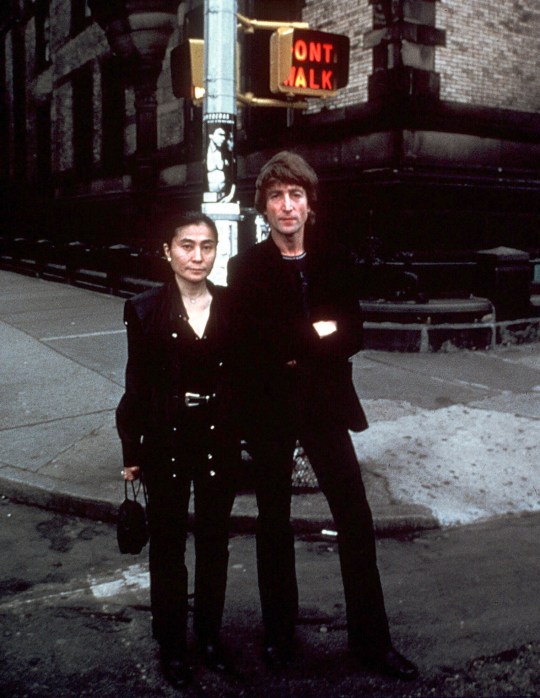
The couple outside the Dakota building in New York, 1980. They bought an apartment there in 1973
John was functionally a child when it came to taking care of himself. But then, that was what May was for. Whatever other intentions Yoko may or may not have had for the assistant, her primary job was to make sure John was properly fed and cared for, that all his basic needs — or at least most of them — were satisfied.
John and I spent a lot of time together over the next several weeks. He was also expanding his friendship circle in LA, hanging out with people like Harry Nilsson, the brilliant but notoriously hell-raising singer-songwriter. But after three or four months, much of his initial enthusiasm had boiled off and his mood was starting to curdle. He was missing Yoko: he began asking me when I thought she’d be ready for him to come home. He started spending more and more time with Nilsson, drinking at the Troubadour till all hours. After John famously got thrown out for drunkenly heckling the Smothers Brothers, the late-night shenanigans moved to the Rainbow Bar & Grill on Sunset. That’s where John and Harry and a collection of others — including my old pals Micky Dolenz and Alice Cooper — formed an infamous drinking club known as the Hollywood Vampires.
It would be difficult to exaggerate the level of unbridled indulgences that took place in the Rainbow’s VIP room, a small alcove atop some stairs overlooking the bar. The amount of alcohol imbibed was staggering, to say the least, and there were also small bags of cocaine discreetly passed into the room. Nilsson, a great big bear of a man, could pound down a dozen or so brandy alexanders — a potent mix of brandy and cream, his cocktail of choice, which John soon adopted as his own — in a single sitting.
Not being a celebrity, I was never invited to become a member of the Hollywood Vampires, but I was a welcome visitor and spent many a late night on the edges of their wild, sometimes harrowing saturnalias.
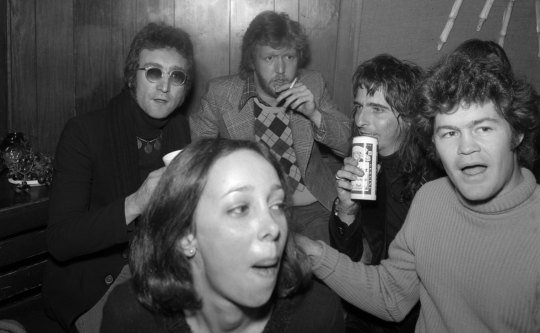
Lennon with his Hollywood Vampires drinking partners, from left, Harry Nilsson, Alice Cooper and Micky Dolenz, November 1973
There was always a crowd of attractive young women at the bottom of the steps leading to the Vampires’ VIP lair. Frankly, though, by the time the boys descended, usually at closing time, most of them were too wasted to take advantage of the opportunity. I lost count of the number of times I all but carried John down those stairs and poured him into whatever car service I had called to the bar’s car park.
For the most part, I kept my promise to Yoko: I kept John safe. But one night, I realised things were starting to spiral out of my control. Normally, John didn’t put up much of a fight when I helped him down the stairs at the Rainbow Bar but on this occasion, he resisted. He didn’t want to go home.
He pushed away and dived straight into the crowd. It was my worst nightmare: a drunken star lost inside a drunken mob.
Finally, I spotted John with Nilsson at the edge of the car park, the two of them climbing into the back of a black limousine. A moment later, it pulled away into the night, going I had no idea where.
John, I realised with a sinking feeling in my gut, was slipping away.
I was about to walk into the nadir of the Lost Weekend, John’s rock bottom. The call came not on the hotline but my regular house phone, and the voice on the other end identified himself as a security officer working for Phil Spector. John was in trouble: could I please hurry over to Adler’s house and help “calm him down”.
What I saw when I stepped into Adler’s living room some 20 minutes later looked like a scene out of The Exorcist. Drunk and wild-eyed, John was strapped to a high-backed chair, his arms and legs restrained with ropes, which he was struggling against with all his might as he shouted obscenities at his captors, a pair of beefy-armed bodyguards who stood in awkward silence nearby. The place was a shambles. John had torn some of Adler’s framed gold records off the walls and smashed them to pieces. Bits of broken wood and shattered Plexiglass littered the floor.
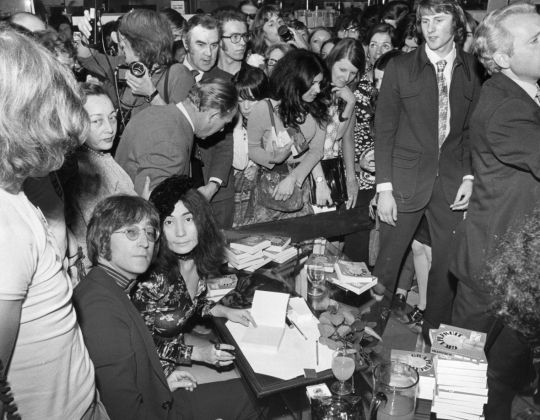
The couple in Selfridges in London where Ono was signing copies of her book Grapefruit, July 1971
Apparently, the meltdown had started earlier that evening at the studio, where John and Phil had nearly come to blows. What precisely they were arguing about, nobody seemed to remember. But the session ended early with Phil’s guards restraining John and shuttling him to Adler’s house, where John slipped away from them long enough to pick up some sort of walking stick or cane, which he swung wildly around the living room until the guards were able to subdue him.
I slowly stepped up to John, who had stopped shouting. His head hung low on his shoulders, his chest heaving furiously. After a long beat, he slowly lifted his eyes to me. He looked possessed.
“Get these ropes off me!” he erupted. “Get them off me, you…”
And then John spat out an epithet so hurtful and offensive, I can’t bring myself to repeat it.
I looked straight into his eyes, barely containing my disgust and disappointment. He looked back into mine. And that exchange of glances seemed to reach some shred of humanity buried deep in John’s alcohol-addled brain. Suddenly he became very, very quiet.
After a moment or two, I turned to the guards. “I think you can take those ropes off him,” I said. “I think he’s done.”
John stood up, rubbed his wrists and, without another word, slowly made his way down the hall to the bedroom, where he must have collapsed on the mattress and passed out.
The next day, as I was getting ready to leave for work, the hotline started flashing.
“Ellie?” John said. “I’m sorry for what I said. But if you think about it, if that’s the worst thing I could say about you, you couldn’t be all that bad, right?”
“Thanks for the compliment,” I said.
“Well, welcome to the real world, Mother Virgin Mary. I’m me. I have a big mouth and express meself the way I feel when I feel it. I don’t hide behind some microphone. I sing into it or speak into it when it suits me. I’m not always the Imagine guy or the Jealous Guy or the Walrus. So I said I’m sorry to you. That’s all I can do.
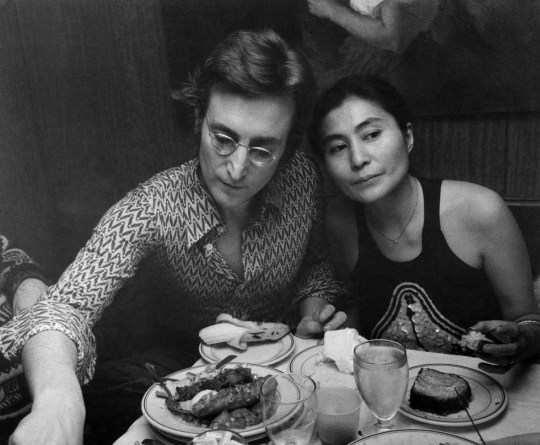
Lennon and Ono in 1972
“Do you want to have dinner?”
“No,” I answered. “I think I’m going to take the night off.”
For the first time I can remember, I was the one who hung up the phone.
Obviously, our friendship took a hit after the incident at Adler’s house; how could it not? For the next several months, John and I barely spent time together — at least, not in person. We would talk almost every day on the phone, as we always had, and eventually our rapport began to feel as easy and familiar as ever. But I no longer joined him for evenings at the Troubadour or the Rainbow.
John, meanwhile, had shifted from the mayhem of the Spector sessions to the slightly lesser bedlam of producing a record for his pal Harry Nilsson. The most notable thing about the Pussy Cats sessions was who else was in the room. Ringo Starr sat in on drums. And although it never made it onto Nilsson’s album, another ex-Beatle unexpectedly turned up and even sang with John, the first time the two of them had performed together since the Beatles split.
I wasn’t present but later heard that Paul McCartney and his wife, Linda, had popped in without warning, bringing Stevie Wonder with them. According to those who were there, John and Paul seemed to pick up their friendship as if they were teenagers again, but when John told me about it later, he was kind of dismissive about it, saying, “They were all just looking at us, thinking that something big was going to happen. To me, it was just playing with Paul.”

Lennon with Harry Nilsson, left, outside the Troubadour club in West Hollywood, having just been ejected for heckling a performance by the Smothers Brothers, March 12, 1974
What John didn’t know, though, was that, according to Yoko, Paul had an ulterior motive for the visit. A few days earlier, she had called me to explain the machinations behind the visit.
Yoko told me she spoke with Paul, who offered to speak with John. “I thought it was very kind,” she said. “I was very appreciative. But I made it very clear to Paul that it wasn’t something I was asking him to do. It would have to be Paul’s idea, not mine.”
To me, there was never any question that John desperately wanted to get back with Yoko. Yes, he had feelings for May, yet at some point during virtually every phone call I had with him, John would sooner or later beseech me to talk to Yoko on his behalf. “Tell Mother I’m ready to come home, Ellie. Tell her I’m a changed man.”
“I don’t think she wants to hear it from me,” I would say. “She wants you to show it to her.”
Paul, I later heard, gave John similar advice. Sometime after popping into the studio in Burbank, he sat down with John and laid out, step by step, what he would need to do to win Yoko back.
It’s impossible to say if Paul’s presentation was what did it, or if John experienced some other epiphany around that time, but over the ensuing months he did indeed begin to clean up his act. In the summer of 1974, he started working on his next album, Walls and Bridges, regularly flying to New York for rehearsals and recordings at the Record Plant on West 44th Street. By all accounts, those sessions were entirely professional, with John showing up 100 per cent sober every day.
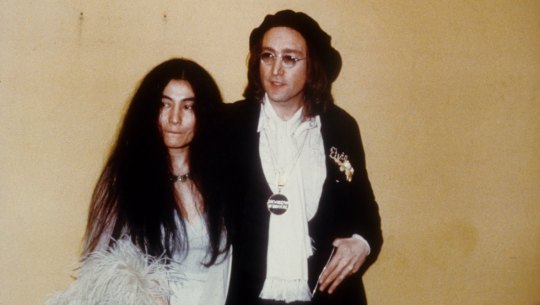
At the Grammy Awards in New York, March 1, 1975
Then, as work on the album neared completion, John made a fateful decision: he decided not to wait any longer for Yoko’s invitation to return to New York. Instead, towards the end of the summer, he and May rented an apartment of their own on the Upper East Side. It was a small but comfortable place that had a wraparound balcony with spectacular views of the East River.
When I flew to New York to tape some interviews, I took the opportunity to pay them a visit — my first face-to-face meeting with John since the ugliness at Adler’s house. It was an awkward encounter for numerous reasons. For one thing, I had just spent an afternoon with Yoko at the Dakota, some 20 blocks away; taking a cab across town to John and May’s felt something akin to betrayal.
Perhaps sensing my apprehension, May gave me a wide berth, leaving to make some phone calls in a bedroom while John and I stood together on the balcony, catching up.
“Does this make you feel uneasy?” John asked after a beat.
“You mean being here with you and May? Yes, a little,” I admitted. “It just reminds me of the fact that you and Mother are still separated, and that makes me sad.”
“Well, that’s the way Mother wants it,” he said. “At least for now.”
Then, unexpectedly, he wrapped his arm over my shoulders and added, “Don’t look so glum, me boy. Put on your radio face. There’s nowhere you can be that isn’t where you’re meant to be.”
It was one of the few times he’d quoted a line to me from a Beatles song.
Walls and Bridges was released a month or so later. John sent a prereleased signed copy (“To my little dream lover on ice, with love and old pianos,” he wrote, referring to my affection for Bobby Darin’s hit song).
As it happened, Elton John had joined John on keyboards for one song on the album. Elton made a bet with John. If the song was a hit, John would have to perform at Elton’s upcoming concert at Madison Square Garden. John agreed, never imagining he’d have to honour that promise.
Of course, Elton was spot on: Whatever Gets You Thru the Night did indeed become John’s first No 1 solo single. And so it came to pass that, in November 1974, onstage at Madison Square Garden, in front of thousands and thousands of fans, that the Lost Weekend finally began to fade to a finish.
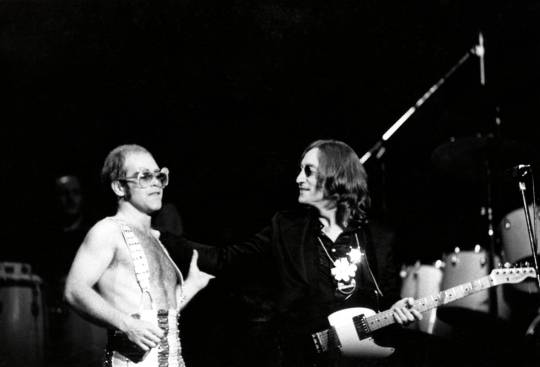
Lennon’s surprise appearance at Elton John’s concert at Madison Square Garden, November 28, 1974
The details of what exactly transpired backstage that night remain, 50 years later, shrouded in some mystery. What is known is that Yoko, who’d been invited to the concert by Elton’s manager, was in the audience. She couldn’t have been prepared for the reaction around her when Elton announced, about two thirds into the concert, that he was bringing John onto the stage for his first public performance in two years. The crowd went berserk.
After the show, Elton’s manager approached Yoko and told her that Elton had requested her presence in his dressing room. Yoko was led backstage to a door with a star on it. She knocked, the entrance opened, and inside she saw her husband standing there, alone.
I cannot tell you what happened after the dressing room door closed behind them. Nobody but Yoko knows that, and she has never shared with me any details. What I can tell you is that in the weeks and months that followed, there must have been many more rendezvous as Yoko and John re-established their connection, even as he continued living with May in their East Side apartment.
According to one of May’s early accounts, John was ultimately hypnotised into ending his relationship with her; she has long claimed that Yoko hired a mesmerist to help John quit smoking but that it was all a ruse to brainwash him into splitting up with her so he could return to Yoko. To this day, many people believe that story. But I know for certain that it wasn’t true. Because, as it happens, I’m the one who arranged the hypnotist.
Yoko had nothing to do with it.
John had remembered that I had interviewed a hypnotist on my radio show and asked me if he might be able to help him kick nicotine.
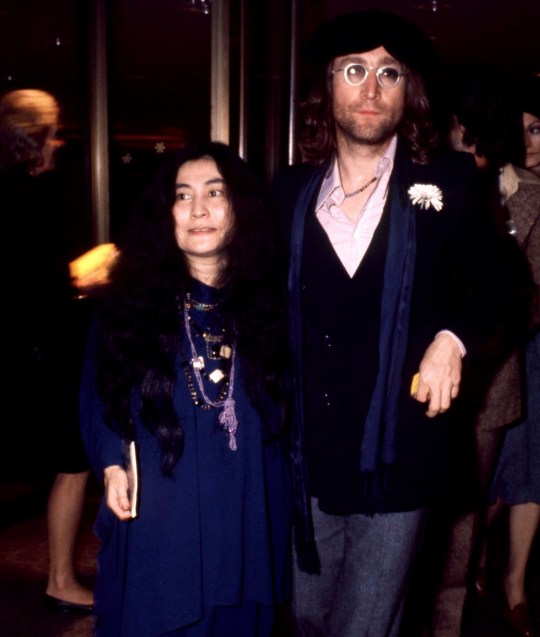
At the Lincoln Center in New York, circa 1975
I called the hypnotist, planned for him to fly to New York, booked him a room in a Midtown hotel, and set up an appointment with John. In just about every respect, though, the hypnosis was a total bust. John told me immediately afterwards he was never put under; the hypnotist claimed John was but just couldn’t remember. The hypnotist also turned out to be something of a diva. He disliked his hotel — he thought the desk clerks were rude — and checked out the next day, flying back to LA in a huff.
John didn’t quit smoking, not for a minute, so it’s hard to imagine the hypnotist had succeeded in brainwashing him into anything else — like, say, leaving a lover. But the very next day, John did break it off with May and returned to the Dakota, resuming his marriage to Yoko and ending, at last, the long and lonely winter that had been the Lost Weekend. He called me in LA shortly afterwards to share the happy news.
He said, “Let the media know the separation did not work.”
‘He’d weigh himself twice a day’
Elliot Mintz on his friendship with John and Yoko. By Georgina Roberts
When a red light in Elliot Mintz’s bedroom flashed, it meant that John Lennon or Yoko Ono was calling him on a special hotline. “In an average week, 20 hours of phone conversation would not be unusual,” the 79-year-old former radio DJ and talk-show host says from his Beverly Hills living room.
Mintz describes the friendship with the couple that “dominated” nine years of his life as “almost a kind of marriage”. He was taken aback when Ono called him in 1971 to thank him for not asking about Lennon when he interviewed her on his radio show. When they began to speak for hours at night, she batted away his concern that her husband might get jealous, saying, “Aren’t you giving yourself a little too much credit, Elliot?”
Lennon first called Mintz to ask if he could get him fat-melting pills. “That was my first conversation with John Lennon. It wasn’t philosophical. It wasn’t about Elvis or the Beatles. It was about weight loss,” he says. Sometimes Lennon would weigh himself twice a day and the couple “were obsessive about diet”.
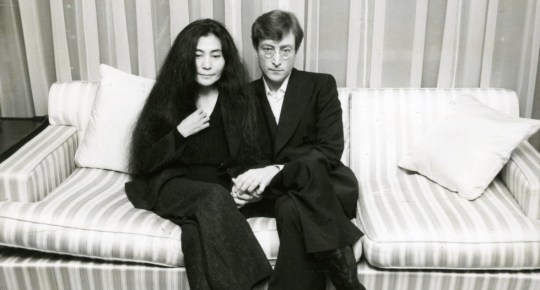
In Hotel Okura in Tokyo, October 1975
After six months of speaking, the couple summoned him to meet them in Ojai, California, where they were trying to kick a methadone addiction. Ono barely spoke until she was in a bathroom with the tap running. “She whispered to me, ‘This house is bugged. Everything we say here, they’re listening. So you have to be very careful what you say.’ ” FBI files released years later showed that Ono wasn’t being paranoid. President Nixon had placed the couple under surveillance after rumours they planned to disrupt his convention, Mintz says.
His clandestine friendship with the couple wreaked havoc on his love life. When he couldn’t explain whom he’d been speaking to in the middle of the night, one love interest assumed he was married and stormed out. “I realised at that moment that my love life would have to take a back seat to my relationship with John and Yoko,” he says.
There were times when lines were crossed in the friendship. One morning, Lennon summoned Mintz to kick out a girl who’d stayed the night. “I told him, ‘Please don’t ask me to do something like that again.’ He flipped out. He said, ‘I will effing ask you to do anything that I feel like asking you to do. Do you understand that?’ ” Mintz was hurt and offended. The next day was one of the few times he said no to “grabbing a bite” with Lennon.
Becoming parents was “the biggest game-changer” for the couple. After his son Sean was delivered via caesarean section in 1975, “John was outraged that when Yoko was clearly struggling, doctors would come up to him and say, ‘I’ve always dreamt of shaking your hand.’ He would bark at them, ‘Look after me wife!’ ”
While Lennon threw himself into childcare, Ono, who came from a banking dynasty, handled the couple’s finances. After becoming stratospherically famous so young, Lennon was “clueless” about money. “I doubt if John was ever in a supermarket, went to a bank, wrote a cheque. That’s what Yoko did,” Mintz says. “If not for Yoko, there’d be no money in the Lennon-Ono estate today.”
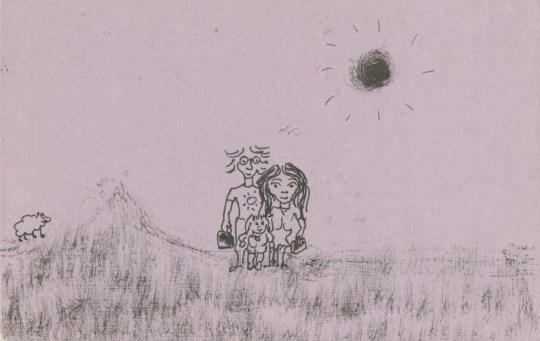
A drawing by Lennon on a postcard from Japan sent to Mintz in 1977
The first time Mintz met their son, Lennon said protectively, “Not too close. Germs.” “He said, ‘Look, we were going to make you the godfather, but we decided on Elton, because he would at least give him better Christmas presents.’ ” “This is typical John,” Mintz says.
Sean would only spend five years with his father before Lennon was murdered outside the Dakota in December 1980. Lennon had always “poo-pooed” Mintz’s requests for him to employ more security. “John said, ‘I’m just a rock’n’roll singer. Who would want to hurt me?’ ”
When Mintz speaks about learning of Lennon’s murder from a weeping flight attendant, his honeyed radio-presenter voice cracks with emotion. “Even now, after all these years, just thinking about that moment…” He trails off. The most gut-wrenching of his responsibilities was making an inventory of Lennon’s possessions. When he signed for a stapled brown paper bag that came from the hospital where Lennon was taken after he was shot, he could not bear to open it. “It was what John was wearing, what he had on him when he fell, including his broken, bloodied glasses.”
He is reticent about his friendship with Ono today. “I want to give her a sense of privacy,” he says, but adds, “It still feels like family. I still love her dearly.” The last time he saw her was at her 91st birthday in February. It was there that Sean encouraged Mintz to write his book, We All Shine On. Does he think Ono will like it? “I’ve never tried to predict a Yoko Ono conclusion.”
How different would his life be if he had never met the couple? “I could have got married. Could have had children.” Were the sacrifices worth it? “Of course. I got to spend that amount of my time with these two extraordinary people.”
We All Shine On: John, Yoko, & Me by Elliot Mintz (Bantam, £25).
(source)
369 notes
·
View notes
Text
@haiku-bot-approved
Where does the haiku bot find all the posts? I am SO fucking confused
2K notes
·
View notes
Text
when nanami dies, there's a box of letters waiting for you.
months pass before you find it. it's not until you're cleaning out his things, wondering if you can stand to get rid of them, that the letters are there waiting for you.
its no bigger than a shoebox, dark wood engraved with an intricate design, one that you're certain kento picked out specifically for you. you've never seen it before, and you open it with shaky hands, tears already pooling in your eyes at all the memories your lover left behind.
inside, there's a stack of letters, each one dated at the top with kento's name intricately signed at the end. some are in sealed envelopes with beautiful stamps. some multiple pages long and include some little haikus that are far too lovely to be about someone like you. and some are just quick little notes scribbled on napkins.
your spread them across the floor, staring down at each of the tiny little hearts he'd drawn next to your name on each note. even though you'd been together for years, you had no idea that he'd been writing all of them—hours of his life dedicated to this little pastime, and you'd been clueless.
they're like journal entires. insights into kento's life and your relationship, both the good moments and the tough ones. he leaves behind everything to you, entrusting you to keep his entire existence safe in your hands.
you read the letters with tears streaming down your face, and you choke on your sobs, trying so hard not to smear the ink from the wetness on your cheeks.
when you pull one out with shaky hands, you realize it's a decade old. the writing has faded a bit, and the paper is yellowing, but it's kento's handwriting, nonetheless.
it makes you near sick to read it. for a minute, you have to set it aside, cry into your knees as you curl into a ball, wondering when you'll ever stop feeling this empty.
this letter is from a sixteen year old kento; a quiet boy who had a silly little crush on girl in his year that was much too pretty for him. and in the letter, he says he knows you're too good for him, but he can't help but love you. he can't help but hope that one day, in a few years, you'll want to marry him as much as he wants to marry you.
it hurts, burns in your chest because even back then, kento had known you were the one. he'd known and he wrote you these letters because he'd felt that his life would be cut short. he'd felt like that since haibara died, and geto left, and it started to seem like the life of a sorcerer was always doomed to be an unhappy one.
kento had been so afraid that his friend died without knowing how much he meant to him, and he refused to make the same mistake with you.
there are letters from even when you weren't together. from the years that you were eighteen, nineteen, twenty, and kento had been so desperate to leave jujutsu behind that it meant he had to leave you too. even then, even when you were nothing more than a shadow from his past, he adored you.
you feel so outside of yourself, nauseous and filled with so much grief that you're not sure where to put it.
sometimes, you’d doubted if kento felt as loved by you as you did by him. but there's pages and pages of him speaking of how special you make him feel, even when you were separated, and he missed you so much that the thoughts of you consumed him.
you spend hours going through the letters, and then, you see one dated halloween, 2018. even breathing feels hard, but you can't stop yourself from reading it, even though you know it will destroy you, know that you won't be able to leave the house for days after reading it.
in the letter, kento says he loves you. he talks about the day before, when you'd convinced him to watch some halloween movies, and though most of them were silly, he didn't care how he spent his time with you as long as it made you smile.
he says that he feels bad for cancelling your dinner plans, and he's going to be thinking of you when he's in shibuya. that it's such a shame that being a sorcerer is so much more fulfilling than a salaryman, because it cuts into your time together, and you’re the most important part of his life.
he says he loves you again. that he really hopes he makes it back from shibuya because even though he's never told you, he wants a family with you.
he says he’s decided he'll bring it up when he gets home safe and sound. he’s not sure how you’ll feel about it, but you better know that he’ll always love you no matter what you decide, even if what he really wants is a little girl that looks just like you. and lastly, he hopes that you don't stay up too late waiting up for him—you’ve been so tired lately, and it’s making him feel bad.
his name is at the bottom with another little heart.
you let the letter fall from your hands.
#AHHH#so this is the aforementioned nanami thought <3#im definitely coping very well#i miss him :( i love him :(#kento 💋 ⋆ ˚。⋆#nanami x reader#kento nanami x reader#nanami angst#xoxo rylie 💌 ୧⋆ ˚。⋆#la bibliothèque des vampires ♱˚.⋆
3K notes
·
View notes
Note
hiii!!!
idk if u do any specific character hcs, but can i request some fluff Chrollo hcs of him as a husband??? (i love Chrollo sm)
ty!!!
Our first Chrollo request we absolutely cheered 🙌 i can absolutely do this !! Thank you for your request 🫶 Hopefully you like this 🥹🥹 first time writing Chrollo so uhhhh.... SORRY IF IT'S SHORTHSJDJD
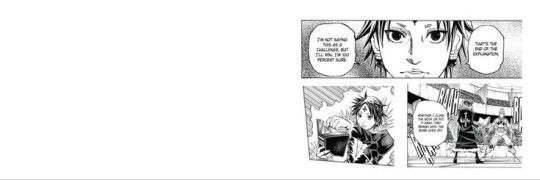
⊹₊⋆ My Sweetheart ! ᶻ 𝗓 𐰁
⊹₊⋆ Gn!Reader x Chrollo Lucilfer ᶻ 𝗓 𐰁
╰┈➤ He's your dearest hubby and the little activities you do w/ each other :3
༉‧₊˚. Start !༉‧₊˚.

• Honestly ? Chrollo would buy ( steal ) expensive gifts for you to make up for his constant absence, being in the Phantom Troupe is busy and all yk
• Oh and I feel like he'd be the type to send little letters just in case he gets caught up in some mission they did.
• The said note would probably have some cheesy and cliche words like "you're the hope of my life." Or something like that, but he absolutely means everything he says.
• He just makes it extra cheesy to make you giggle or flash a smile in thought of him.
• Now that that's away– I feel like Chrollo would show his affection by his actions and words.
• Actions, he does very small gentleman-like things, like pushing the door for you, holding your hand whenever you descend from some stairs, having a hand on your waist whenever he'd guide you to someplace, and more!
• Words, he pulls up late at night with a damn haiku in his hand, and he holds your hand with his free hand as he reads it aloud to you.
• You find it both cheesy and romantic, but his eyes definitely don't deceive. The man is truly in love with you.
• Since he probably grew up in poverty, Chrollo wants to provide both of you financially enough, even if it means to go through harsh lengths.
• In a scenario where you didn't know your husband is the boss of the Phantom Troupe, Chrollo continues to keep it a secret as that information could truly break one's relationship. Chrollo treats you like a man in love with his wife would, and he is still whipped.
• In a scene where you ARE aware your husband is in the Phantom Troupe, then you're a member yourself who grew up with Chrollo. During "missions" You supported the troupe and Chrollo's personal assistant ( literally ) since he is your husband.
• Let's go to how he proposed, shall we ? :3
• In a scenario where you aren't aware, Chrollo proposes to you in a very elegant and beautiful secluded area. He had a very beautiful ring in his hand and a genuine smile plastered on his face, he spoke up. "It would be an honor for a being like you to be wedded to a mortal like me. Will you make my wish come true, yn?"
• In a scenario where you are aware, he proposed to you during a mission. Pulling you aside to hide you from the many explosions and gun shots, he stands on one knee, looking up to you like you're his god(dess). "Oh, my dear. You are one of a kind, if we are to be bound for eternal life, I shan't complain. However, are you? Willing to be bound in a heartstring with me for eternal life?" ( yes this is a spy x family reference )
• He does a lot of things for you though ! In a scene where you're injured, Chrollo is automatically by your side, soothing your nerves and rubbing your arm.
• Chrollo might not show it through physical touch, but when he does, it's during moments where you and him are truly vulnerable– to feel each other's skin, palm against palm, it's something Chrollo wouldn't naturally do to other people. You, are his sweetheart, so he'd do it within a heartbeat.
• You strummed his heartstrings, and he was tied to your soul, a fit from the universe, he claims.

༉‧₊˚. End !༉‧₊˚.
Thank you for reading ! This strictly belongs to me / killuakiru and I do not give permission for you to repost on other platforms, thank you !
#hunter x hunter#hxh#hxh 2011#hxh chrollo#hxh x reader#hxh fanart#hxh x you#chrollo lucilfer#chrollo x reader#chrollo hunter x hunter#hunter x hunter x reader#hxh phantom troupe#phantom troupe x reader
217 notes
·
View notes
Text
Writing Notes: Poetry

Poetry
A type of literature that conveys a thought, describes a scene or tells a story in a concentrated, lyrical arrangement of words.
Poems can be structured, with rhyming lines and meter, the rhythm and emphasis of a line based on syllabic beats.
Poems can also be freeform, which follows no formal structure.
The basic building block of a poem is a verse known as a stanza.
A stanza is a grouping of lines related to the same thought or topic, similar to a paragraph in prose.
A stanza can be subdivided based on the number of lines it contains.
For example, a couplet is a stanza with two lines.
On the page, poetry is visibly unique: a narrow column of words with recurring breaks between stanzas. Lines of a poem may be indented or lengthened with extra spacing between words. The white space that frames a poem is an aesthetic guide for how a poem is read.
Meter
A poem can contain many elements to give it structure.
Rhyme is perhaps the most common of these elements: countless poetic works, from limericks to epic poems to pop lyrics, contain rhymes.
But equally important is meter, which imposes specific length and emphasis on a given line of poetry.
Stanza
In poetry, a stanza is used to describe the main building block of a poem.
It is a unit of poetry composed of lines that relate to a similar thought or topic—like a paragraph in prose or a verse in a song.
Every stanza in a poem has its own concept and serves a unique purpose.
A stanza may be arranged according to rhyming patterns and meters—the syllabic beats of a line.
It can also be a free-flowing verse that has no formal structure.
Rhyme Scheme
There are many different types of rhymes that poets use in their work: internal rhymes, slant rhymes, eye rhymes, identical rhymes, and more.
One of the most common ways to write a rhyming poem is to use a rhyme scheme composed of shared vowel sounds or consonants.
Types of Poetic Forms
Some of literature’s most enduring types of poems.
Blank verse. Blank verse is poetry written with a precise meter—almost always iambic pentameter—that does not rhyme.
Rhymed poetry. In contrast to blank verse, rhymed poems rhyme by definition, although their scheme varies.
Free verse. Free verse poetry is poetry that lacks a consistent rhyme scheme, metrical pattern, or musical form.
Epics. An epic poem is a lengthy, narrative work of poetry; typically detail extraordinary feats and adventures of characters from a distant past.
Narrative poetry. Similar to an epic, a narrative poem tells a story. Henry Wadsworth Longfellow’s “The Midnight Ride of Paul Revere” and Samuel Taylor Coleridge’s “The Rime of the Ancient Mariner” exemplify this form.
Haiku. A 3-line poetic form originating in Japan. The first line has five syllables, the second line has seven syllables, and the third line again has five syllables.
Pastoral poetry. A pastoral poem is one that concerns the natural world, rural life, and landscapes. These poems have persevered from Ancient Greece (in the poetry of Hesiod) to Ancient Rome (Virgil) to the present day (Gary Snyder).
Sonnet. A sonnet is a 14 line poem, typically (but not exclusively) concerning the topic of love. Sonnets contain internal rhymes within their 14 lines; the exact rhyme scheme depends on the style of a sonnet.
Elegies. An elegy is a poem that reflects upon death or loss. Traditionally, it contains themes of mourning, loss, and reflection. However, it can also explore themes of redemption and consolation.
Ode. A tribute to its subject, although the subject need not be dead—or even sentient, as in John Keats’ “Ode on a Grecian Urn”.
Limerick. A 5-line poem that consists of a single stanza, an AABBA rhyme scheme, and whose subject is a short, pithy tale or description.
Lyric poetry. The broad category of poetry that concerns feelings and emotion. This distinguishes it from two other poetic categories: epic and dramatic.
Ballad. A form of narrative verse that can be either poetic or musical. It typically follows a pattern of rhymed quatrains. From John Keats to Samuel Taylor Coleridge to Bob Dylan, it represents a melodious form of storytelling.
Soliloquy. A soliloquy is a monologue in which a character speaks to him or herself, expressing inner thoughts that an audience might not otherwise know. Soliloquies are not definitionally poems, although they often can be—most famously in the plays of William Shakespeare.
Villanelle. A nineteen-line poem consisting of five tercets and a quatrain, with a highly specified internal rhyme scheme. Originally a variation on a pastoral, the villanelle has evolved to describe obsessions and other intense subject matters, as exemplified by Dylan Thomas, author of villanelles like “Do Not Go Gentle Into That Good Night.”
Imagery
In poetry and literature, imagery is the use of figurative language to evoke a sensory experience in the reader.
When a poet uses descriptive language well, they play to the reader’s senses, providing them with sights, tastes, smells, sounds, internal and external feelings, and even internal emotion.
Blank Verse & Free Verse Poetry
Free verse poetry has been popular from the 19th century onward and is not bound by rules regarding rhyme or meter.
Blank verse poetry came of age in the sixteenth century and has been famously employed by the likes of William Shakespeare, John Milton, William Wordsworth, and countless others.
Unlike free verse, it adheres to a strong metrical pattern.
Mimesis
Copying is something writers usually strive to avoid.
And yet, the literary theory of mimesis says that artists copy constantly, as a matter of necessity.
Does this make their art bad?
Centuries of thinkers from Plato and Aristotle onwards have attempted to answer this question by debating the nature of mimesis.
Onomatopoeia
Usually, how words sound bears no relationship to what they mean.
That’s not true in the case of onomatopoeia, where words sound like what they are. The English language is littered with these mimicking words, from meowing cats to babbling brooks.
In poetry and literature, the onomatopoeic effect is something writers can harness to create vivid imagery without verbosity.
Enjambment
Poetry is a structured literary form, with patterns and rhythms that dictate the flow of verses.
Lineation in poetry is how lines are divided and where they end in relation to a clause or thought. Having a line break at the end of a phrase or complete thought is a regular and expected pattern in poetry.
Poets subvert this expectation by using a technique called enjambment.
Dissonance
The human brain instinctively looks for harmony.
When it is denied harmony, it can create a powerful moment—whether that’s for the purposes of creating tension, capturing inner turmoil, or bringing a bit of levity.
Injects discomfort into text through inharmonious sounds and uneven rhythms.
Consonance
In poetry, rhyme isn’t the only way to introduce memorability and musicality.
Consonance presents poets with the possibility of playing around with the repetition of consonant sounds.
Assonance
Assonance, the repetition of vowel sounds, is distinct from consonance, which refers to the repetition of consonant sounds.
Along with rhyme and alliteration, it is a powerful poetic device that writers can use to make their words stand out.
Alliteration
Sometimes called initial rhyme or head rhyme, alliteration is one poetic device that’s unmissable in our everyday world.
Poets, advertisers and headline writers all regularly take this approach of repeating initial letter sounds to grab people’s attention.
In poetry, it also injects focus, harmony, and rhythm.
Source ⚜ More: Notes ⚜ References for Poets ⚜ Writing Resources PDFs
#poetry#writeblr#literature#writers on tumblr#writing reference#dark academia#spilled ink#writing prompt#creative writing#light academia#writing notes#poets on tumblr#pyotr konchalovsky#writing resources
129 notes
·
View notes